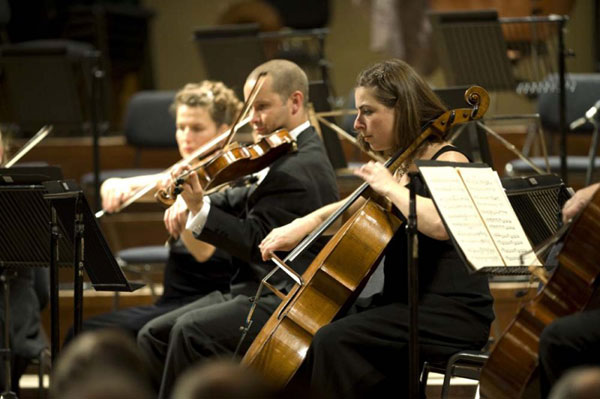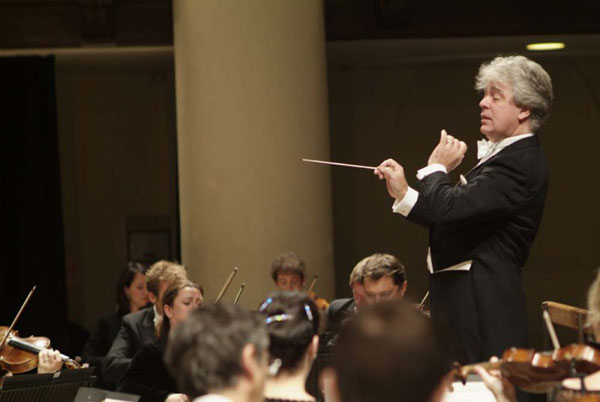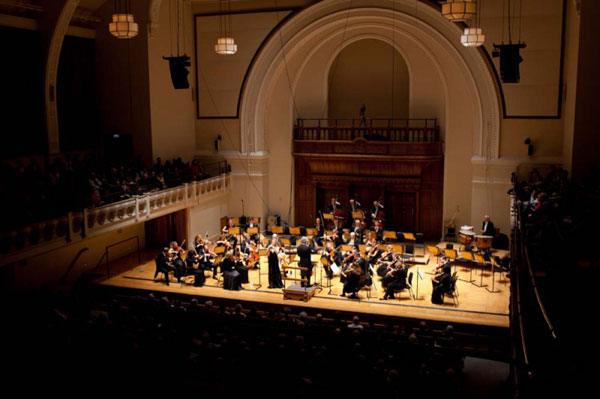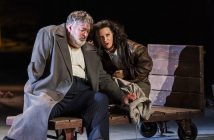The oldest professional chamber orchestra in the UK, the London Chamber Orchestra was founded in 1921 by Anthony Bernard and continues to promote new work alongside their extensive repertoire of well known composers. Based at the Cadogan Hall in Chelsea and St John’s Smith Square in Westminster during their London season, the LCO have also been invited to perform at notable royal occasions including the wedding service of the Duke and Duchess of Cambridge in 2011 to an estimated audience of 2 billion.

It was only fitting that Vaughan Williams’ Fantasia on a theme by Thomas Tallis opened the Diamond Jubilee concert at the Cadogan Hall, celebrating English composers. Despite not having been recorded until 1936, the Fantasia quickly established itself as one of the nation’s most beloved orchestral works, reaching third place in the 2012 Classic FM Hall of Fame – voted for by listeners.
Conducted by the director of the LCO, the great Christopher Warren-Green, the first distinct yet tense notes were hypnotic, incorporating the classic orchestra division in the Cadogan Hall’s organ gallery to superb effect. Originally premiered in 1910 at the Three Choirs festival at Gloucester Cathedral, the Tallis Fantasia, as it’s now more commonly known, was designed to be played with a twin orchestra configuration ‘Orchestra I’ and ‘Orchestra II’ – intended to resemble an organ in sound and maximising not only the acoustics of the cathedral but the atmosphere and melancholy of the piece.
Regarded as one of the most historic concerts in the history of English music, Vaughan Williams, aged 37, prepared to conduct his just-finished piece, sharing the billing with Elgar’s popular The Dream of Gerontius – the piece which the 2,000 strong audience were really there to hear. Despite Williams being a well known agnostic, a unique spirituality pervades his exploration of Tudor music with a depth many found indigestible at the time.

Vaughan Williams discovered Tallis’ nine psalm chant tunes in Archbishop Parker’s 1567 metrical Psalter during his revision of the English Hymnal in 1906, taking inspiration from ‘Third Mode Melody’ for his later Fantasia. Thomas Tallis was one of the leading English composers of sacred music during the 16th century, many of which were commissioned by Elizabeth I, when Tallis was forced to conceal his Catholic beliefs. The expansive Tallis theme is played three times throughout Vaughan Williams’ Fantasia, with variations which become increasingly stirring to see performed, especially when members of the LCO, including the charismatic Warren-Green, were so clearly impassioned.
The concert continued with Delius’s The Walk to the Paradise Garden conjuring up ambrosial pastoral scenes of romance, and Caprice and Elegy, both played with a deftness of touch and sensitivity that sets the LCO apart. Delius, born in Bradford in 1862 to German parents, was sent, at the age of 22, to Florida to manage an orange plantation, where he neglected his duties before deciding to embark on a career as a composer, against the wishes of his father. After formal musical study in Germany, it wasn’t until conductor Thomas Beecham championed his work that Delius became a household name. He ended his life a victim to syphilis – blind and paralysed and unable to compose without assistance. Delius, the man Elgar described as a ”poet and a visionary”, was able to convey the influences of his life in England and time abroad through his music, touching on the hope, tragedy and disappointment of love.

The performance of one of John Ireland’s most popular works, Holy Boy, was followed by the triumphant and energetic Enigma Variations Op.36 – a piece Elgar dedicated to his loyal friends, later revealed as his wife Alice, music publisher Augustus Jaegar and himself. The mystery or ‘Enigma’ does not refer to the identity of the persons portrayed in the music however, but the theme on which the variations are based. As Elgar himself later wrote ”the Enigma I will not explain – its ‘dark saying’ must be left unguessed”. The best known of all Elgar’s works, especially Variation IX (Adagio) Nimrod, although critics were peeved at the cryptic elements, it achieved international recognition after premiering in London in 1899. With Julian Lloyd Webber on cello, it was an awe-inspiring conclusion to a programme of some of the finest English music ever produced.
The London Chamber Orchestra returns to St John’s Smith Square on October 17th with performances of Schubert’s Symphony No.8 in B minor Unfinished and Beethoven’s Piano Concerto No.4 in G major op.58 and Symphony No.5 in C minor op.67. Price: £28/£22/£15. For further concert dates visit www.lco.co.uk



